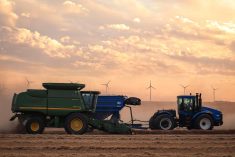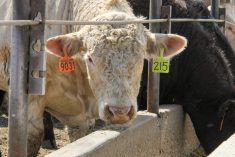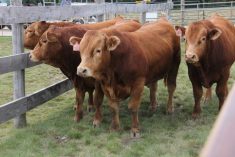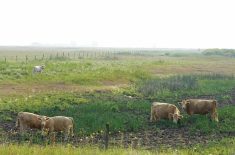Expansions and extensions for tax credits of use to Manitoba farmers and small agribusinesses were laid out Thursday in the province’s latest budget.
Finance Minister Greg Dewar’s plan calls for an expansion of the province’s small business venture capital tax credit, broadening its list of eligible businesses to include “non-traditional farming” ventures, as well as brew pubs.
The budget also doubles the maximum number of employees for businesses eligible for the tax credit, to 100 people, bringing it in line with Industry Canada’s definition of “small business,” the province said.
Read Also

China buys U.S. soybean cargoes ahead of Trump-Xi meet, sources say
China’s state-owned COFCO bought three U.S. soybean cargoes, two trade sources said, the country’s first purchases from this year’s U.S. harvest, shortly before a summit of leaders Donald Trump and Xi Jinping.
Dewar’s budget also expands the province’s green energy equipment tax credit, which previously offered tax credits of up to 15 and 10 per cent on businesses’ purchases of geothermal and solar thermal heating equipment, respectively.
The expansion calls for a credit of up to 15 per cent on purchases of biomass fuel energy equipment, if installed in Manitoba and used in a business.
The budget also sets up a three-year extension of the province’s nutrient management tax credit, a 10 per cent refundable tax credit for farmers and corporations buying prescribed nutrient management equipment “designed to meet Manitoba water quality standards.”
The nutrient management credit, set to expire at the end of this year, will now run until the end of 2018.
The budget also increases the income limit for businesses eligible for Manitoba’s small business deduction to $450,000, up $25,000, starting Jan. 1, 2016. Canadian-controlled private corporations that qualify for the province’s small business deduction pay a zero per cent rate of Manitoba corporation income tax.
The budget also doubles the period during which unused provincial scientific research and development (SR+ED) tax credits can be carried forward after they are earned, to 20 years.
On matters of food security, the budget also calls for development of a new retail food subsidy to offset the costs of “healthy foods” in 10 of Manitoba’s most remote communities.
The subsidy, the province said, “will complement Manitoba’s promotion of local food social enterprise development in northern communities.”
In all, the budget calls for a $422 million deficit for 2015-16, with revenue projected to increase $179 million or 1.2 per cent from the 2014-15 forecast, and expenditures up $289 million (1.9 per cent) from the 2014-15 forecast. — AGCanada.com Network











